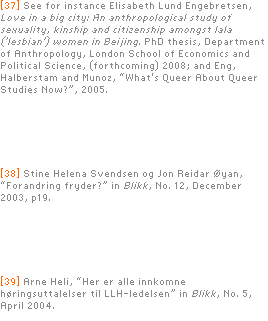| 
On June 12, 2007, one could hear Langfeldt on public radio say that some of the men who are sexually abusive to boys have a “homophile cast of personality” (homofil legning) that they have suppressed since they themselves were boys, indeed since they were 7-8 years old. Society, he said, must help these boys with an early acknowledgement of their “homophile cast of personality”. Langfeldt's message was echoed in the same radio programme by the chair of The Association (Øyan) and also by the State Secretary (Øie), both mentioned above. Langfeldt's project seems in some ways to be similar to Moseng's: to make visible the pitiful homophile individuals and come to their rescue. It is alarming that central agents for gay politics have no critical questions. |  | 
| 
|  |  | From a queer perspective and from some other theoretical starting points as well, we might ask a few.[36] Is not the development of a sexual identity something that takes place during the course of life? Is it not strangely dogmatic and stigmatising to require a conscious confession or claim from 7-year-old boys about their “homophile cast of personality”? Moreover, what is it about this “cast of personality” that might have such catastrophic consequences if undisclosed? Should not every boy, and girl, regardless of the orientation of their sexual desire, be taught by caring adults that there is a potential for the abusive execution of power in sex? Should not every young person learn to reflect upon power in sexual relations and the potential for coerciveness and domination in sex as well as learn something about the shifting character of power itself? Are there aspects of the heterophile cast of personality, oppressed by society, inciting the child to turn into a sexually abusive adult? Or perhaps heterosexuality has no obligation to explain itself in this connection? |  | 
| 
|  |  | 
It is urgent to reorient the politics of a gay establishment whose policy seems to be increasingly irrelevant to the present challenges, if not counter-productive. And it is even more important in a world where the western configurations of sex and gender obviously carry colonial and imperialist values in their complex and sometimes violent meetings with those of other nations and cultures.[37] It does not seem likely that a reorientation of the gay elite will happen any time soon. So far Øie, Øyan, Lindstad, Haugli and Moseng - the bureaucrat, the activist, the politicians and the researcher - all agree to denounce queer perspectives on sexual politics. They probably will not change the way they understand anti-discriminatory politics, anti-homonegativity and anti-homophobia until they have to. The present chair of The Association is in this connection quite interesting as a political agent. Jon Reidar Øyan was all in favour of queer politics before the national gathering of The Association in 2004.[38] He was, however, elected chair on a political platform that was in no substantial way changed towards queer. Since then he has come across as more pragmatic, saying to the newspaper Klassekampen in 2006 that we will have to keep the categories “until we have equal rights”. The gay and lesbian movement must, of course, be pragmatic and take into consideration what one of the veteran gay politicians said to Blikk in 2004: a queer organisation cannot just go and get money from the state. “Money from the state is given out on far different premises!”[39] Correct then, and still is, I am afraid. |  | 
| 
|  |  | However, I am glad to have met with young activists who are finding ways to reorient sexual politics from what it seems to be all about right now, i.e. basically saving homophiles from blurred sexual categories, from drugs, mental sickness and suicide, and in the very same move producing them as pure victims (if one is not so lucky that one is in the safe haven of marriage). Queer enables a critique of contemporary gay politics, but I understand queer as a temporary point of departure while expecting yet another generation of sexual dissidents to come along, seemingly equipped with their own ideas, beyond queer again. |  | | 
|  |  | 

|  |  |
|